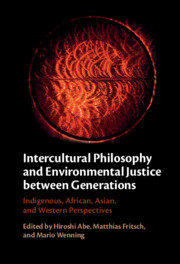 Intercultural Philosophy and Environmental Justice between Generations
Intercultural Philosophy and Environmental Justice between Generations Book contents
- Intercultural Philosophy and Environmental Justice between Generations
- Intercultural Philosophy and Environmental Justice between Generations
- Copyright page
- Contents
- Contributors
- Acknowledgments
- Introduction
- Part I Indigenous Philosophies on Justice between Generations
- 1 Indigenous Philosophy and Intergenerational Justice
- 2 Climate Ethics and Intergenerational Reciprocity in Indigenous Philosophies
- 3 Intergenerational Justice and the Environment in Africa
- 4 Reasonabilism, Homeostasis and Intergenerational Justice in African Thought
- Part II Intergenerational Ethics in Dialogue with Confucianism and Daoism
- Part III Humanity Facing the Near Environmental Future
- Index
- References
2 - Climate Ethics and Intergenerational Reciprocity in Indigenous Philosophies
from Part I - Indigenous Philosophies on Justice between Generations
Published online by Cambridge University Press: 14 March 2024
- Intercultural Philosophy and Environmental Justice between Generations
- Intercultural Philosophy and Environmental Justice between Generations
- Copyright page
- Contents
- Contributors
- Acknowledgments
- Introduction
- Part I Indigenous Philosophies on Justice between Generations
- 1 Indigenous Philosophy and Intergenerational Justice
- 2 Climate Ethics and Intergenerational Reciprocity in Indigenous Philosophies
- 3 Intergenerational Justice and the Environment in Africa
- 4 Reasonabilism, Homeostasis and Intergenerational Justice in African Thought
- Part II Intergenerational Ethics in Dialogue with Confucianism and Daoism
- Part III Humanity Facing the Near Environmental Future
- Index
- References
Summary
The chapter proposes a concept of justice for future people that is mindful of Indigenous critiques of the Anthropocene and associated climate horror scenarios. I first review these critiques, which suggest that motivating pro-futural care by dreading an impending climate crisis tends to betray a privileged, often settler-colonial perspective. On this basis, I then review various Indigenous accounts of intergenerational relations, in which I find one common idea in the claim that present generations owe to descendants in part because they received a gift from ancestors. I seek to model and defend this view and its social ontology (I call it “asymmetrical reciprocity”). I then seek to show how asymmetrical reciprocity can help to decolonize the future by disallowing a linear view of time according to which a focus on the future permits the neglect of the past. Hence, climate ethics and intergenerational justice must face the history of colonialism.
Keywords
- Type
- Chapter
- Information
- Intercultural Philosophy and Environmental Justice between GenerationsIndigenous, African, Asian, and Western Perspectives, pp. 33 - 58Publisher: Cambridge University PressPrint publication year: 2024
